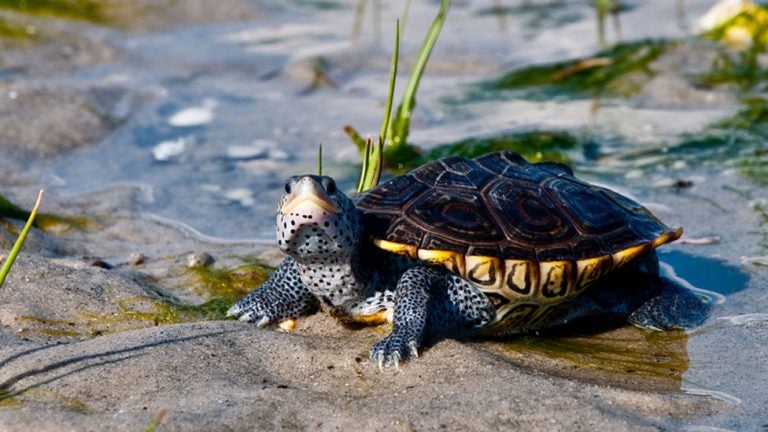Pa. man gets jail time for trafficking protected turtles from N.J. marshes
A Pennsylvania man has been sentenced to a jail term for trafficking protected turtles.

A diamondback terrapin turtle. (Big Stock)
A Pennsylvania man has been sentenced to a jail term for trafficking protected turtles.
The U.S. Attorney’s Office for the Eastern District of Pennsylvania says United States District Judge Anita B. Brody sentenced David Sommers, 64, of Levittown on Thursday to a six month jail term, three years supervised release, including six months of home detention, and $250,000 restitution.
Sommers had previously pleaded guilty to one count of false-labeling of packages containing protected diamondback terrapins. From November 2011 until October 2017, Sommers poached thousands the protected turtles and their eggs from New Jersey coastal marshes and illegally sold the turtles, according to prosecutors.
The U.S. Attorney’s Office says the total value of the Sommers’ sales figures and inventory of poached wildlife was worth well over $550,000.
“The defendant had a simple business plan: poach protected turtles and their eggs from their natural habitat, advertise them for sale online and then illegally ship them to customers by concealing the actual contents of the packages,” said U.S. Attorney William M. McSwain.
Terrapins are a native New Jersey turtle prized in the reptile pet trade for their unique shell markings. The turtles are protected under New Jersey law and by an international treaty.
The New Jersey hunting and harvesting prohibition, signed into law in 2016, came in response to an incident involving a massive amount of diamondback terrapins harvested in the state.
In 2013, a harvester used a commercial crabbing dredge to take more than 3,500 from two locations in South Jersey and sell to an aquaculture facility in Maryland, which an investigation revealed used the catch to raise 14,000 terrapins to sell overseas.
They also face numerous other challenges, including predation, habitat loss, drowning in crab traps, becoming pets, and getting struck by cars.
WHYY is your source for fact-based, in-depth journalism and information. As a nonprofit organization, we rely on financial support from readers like you. Please give today.




